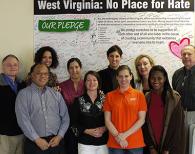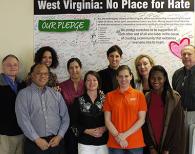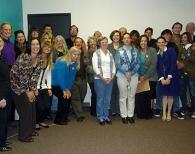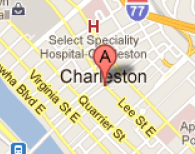There is a moment in the documentary, Light in the Darkness, that has lingered with West Virginia resident Paul Sheridan.
In the film, Patchogue, N.Y. mayor Paul Pontieri returns to the intersection where Ecuadorian immigrant Marcelo Lucero was murdered. Pontieri meets a man, he discovers, who has been a neighbor to Pontieri’s family for 25 years.
“I didn’t know who he was,” Pontieri says. “Do they make themselves invisible, or do we make them invisible by not seeing them?”
It’s a relevant question for many communities with changing demographics. Sheridan, a community leader who cares about safety and inclusion, asks, “What are the communities that we are blind to? That’s the question that hangs in the air a little bit, and we haven’t really thought through how we’re reaching out.”
One Kanawha

What can you do when a notorious hate group targets a wide array of institutions in your community, each of which has its own leadership, values, and organizational methods?
That's the situation that faced Charleston and Wheeling, West Virginia in March, when Fred Phelps' Westboro hate group announced it would picket Catholic and Jewish institutions in the two towns, a local university, and a mine where more than a dozen miners had recently lost their lives.
What they came up with was "West Virginia: No Place for Hate," a multi-pronged action campaign that was featured on NIOT.org last month.
NIOT executive producer Patrice O'Neill spoke to some of the campaign leaders, including members of OneKanawha, the NIOT group in Charleston. "Turning Hate into Opportunity in West Virginia" features the lessons they've shared.

What can a community do when a hate group comes to town and targets a wide variety of organizations, each of which have different ideas of how to respond -- or not?
That's what happened in Charleston and Wheeling, West Virginia in March 2010. The Westboro Baptist Church hate group announced it would picket Jewish and Catholic institutions, a local university, and, as a last-minute addition designed for maximum emotional anguish, the Montcoal Mine, where a dozen miners had just lost their lives.
How could the community respond, particularly when some people preferred to keep a low profile, while others wanted to stage a loud counter-protest? Who could even lead such a community response, given the different values of the targeted groups?
A coalition of local leaders convened at Temple Israel, one of the targeted institutions, and decided they had to present a united front. The message had to be broad enough to include everyone, but specific enough to show opposition to the hatred espoused by Westboro.

From November 3 to 6, Not in Our Town Executive Producer Patrice O'Neill and Civic Engagement Coordinator Jason Wallach toured West Virginia and led a series of open discussions about how to build safe, strong, hate-free communities throughout the state.
